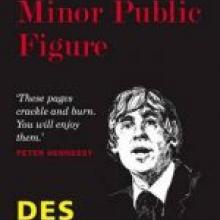
Des Wilson
Quartet
Now, 55 years later, Wilson has penned his memoirs at length, revelling in minutiae. Severe condensation would have served the reader much better, but Wilson obviously felt the need to document his hugely successful - for the most part - career with footling details that soon become boring.
Wilson's main claim to fame in Britain will always be as the driving force behind Shelter, the national campaign for the homeless, of which he was appointed director when 25.
His career began in the Oamaru office of the Otago Daily Times. He describes his boss, Maurie Tonkin, as "probably the most humourless, unimaginative and uncommunicative man I ever met". Oh, dear, what a gross calumny. I, and others among my contemporaries, have memories of Maurie as a hard-working journalist, never short of a humorous quip and ever-ready for a chat.
Wilson later joined the Evening Star in Dunedin, which he describes as "one of the happiest times of my life".
It was, he writes (perhaps in relief at escaping Tonkin's clutches), "an outstanding newspaper, full of fascinating characters and brilliant journalists, amiably led by a good-natured news editor called Buzz Harte who went on to become a big shot in television when it eventually came to the country".
Here, Wilson's memory, understandably enough, is deficient.
Harte made his later mark as top journalist with the state radio broadcaster. (Nor was it from Oamaru Harbour that the first New Zealand frozen meat was sent overseas, as Wilson states. The meat, of course, went from Port Chalmers).
It was as director of housing charity Shelter that Wilson writes, quite accurately, that he "was becoming famous". In two separate years while he was at Shelter, Britain broke all housing records. "That had not been done before and has not been done since."
Wilson went on to flex his considerable organisational abilities with enterprises as diverse as the Royal Shakespeare Company (head of public affairs), the Clear campaign for lead-free air (chairman), Friends of the Earth (chairman), Citizen Action (chairman), Campaign for Freedom of Information (chairman), Parents Against Tobacco (chairman), Liberal Party (president), the MCC (adviser), and English Cricket Board (member).
He fulfilled many other responsible work assignments, which included writing for the quality press.
It is obvious that Wilson possessed the extrovert personality and the consummate organising ability which enabled him successfully to direct campaigns for civil rights and social justice that yielded outstanding results. Often, he had to mount offensives against strong opposition forces.
Having retired with his wife to Cornwall, Wilson has steeped himself in the intricacies of poker, and he has written two books on the game.
He is indeed a remarkable New Zealander, whose memoirs, though far too detailed, are worth perusing as an example of what a gung-ho attitude can achieve for the ambitious who do not lack talent and determination.
Memoirs of a Minor Public Figure contains many monochrome photographs.
- Clarke Isaacs is a former chief of staff of the Otago Daily Times.












